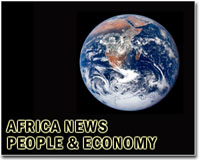| . |  |
. |
Kinshasa, Democratic Republic Of Congo (UPI) Jul 2, 2010 The Democratic Republic of the Congo faces further upheaval amid the seemingly endless fighting over the resources in its eastern provinces as the United Nations pulls out some of its 20,000 peacekeepers. Around 2,000 of the blue helmets are scheduled to be withdrawn because Kinshasa insists the peacekeeping force violates the country's sovereignty. That number is far less than the Kinshasa government of President Joseph Kabila wants, which is all of the U.N. troops out by September 2011 when a presidential election is scheduled. U.N. officials have tried in vain to convince Kinshasa that rolling up the decade-old peacekeeping operation, the largest undertaken by the world body, will plunge the mineral-rich Central African state into total chaos and threaten the survival of the government itself. On Wednesday, the government marked the 50th anniversary of its independence from Belgium, even though there was little occasion for celebration in a land the size of Western Europe that has been ravaged by war since 1996, deemed the bloodiest conflict since World War II. A year later the president's father, Laurent Kabila, overthrew the 32-year dictatorship of Mobutu Sese Seko, a pro-Western ruler pandered to by the West because he was seen as a bulwark against communism during the Cold War. Laurent Kabila was assassinated and succeeded by his son, who won a landmark election in 2006 even as the rebellion splintered the country among a pack of vicious warlords. The DRC, a country of 63 million in the heart of Africa, was then caught up in the genocide in neighboring Rwanda, and the battle for Congo's vast riches began. Uganda, Rwanda, Burundi, Angola, Namibia and Zimbabwe among others have been caught up in the conflict in which some 5 million people have perished, mainly from disease and starvation. The International Red Cross estimates 45,000 die every month. The war supposedly came to an end in 2003 when a peace settlement was reached by the main protagonists and a transitional government established. But fighting has continued in the lawless eastern part of the country where rebel holdouts still plunder, rape and murder. The Congolese army is still weak and often predatory, while the economy is on its knees. On Thursday, the International Monetary Fund and the World Bank agreed to support $12.3 billion in debt relief for the DRC, even though the country is immensely rich in resources. There is gold, copper, diamonds, uranium and tantalum, known as coltan, which is used in electronic devices such as cellphones and computers. There are also large deposits of carriterite, or tin ore, widely used in the electronics industry, and wolframite, the ore for tungsten used to manufacture mobile phones. The various states in the Great Lakes region have largely financed their military forces by plundering the DRC's minerals, timber and other resources. Global Witness, a British human-rights organization, says that "mineral exploitation and trade in the DRC has proven so lucrative that it has become almost an end in itself for all the warring parties -- from the official National Army brigades to the numerous and shape-shifting rebel coalitions." The DRC is also rich in water power. The flow of the mighty Congo River could one day light up the entire continent. A plan to build the most powerful hydroelectric dam ever conceived could also become a cause of conflict in a region where war and slaughter is endemic. The 40,000 megawatts of power the $80 billion Grand Inga Dam could generate would double the amount of electricity available in all of Africa. The discovery of substantial oil reserves around Lake Albert in 2007 could also fuel the conflict. Tullow Oil of Ireland and Heritage Oil of Canada discovered a field estimated to hold several billion barrels of oil. If that proves to be the case, it will be the largest onshore field found in sub-Saharan Africa for two decades. Tullow believes there is also a vast reservoir of natural gas that could produce 14 million cubic feet a day. The U.N. peacekeepers have not been able to halt the fighting across the DRC, but without them the bloodletting will almost certainly get worse.
Share This Article With Planet Earth
Related Links Africa News - Resources, Health, Food
 Foreign agents in shooting of Rwandan general: S.Africa
Foreign agents in shooting of Rwandan general: S.AfricaPretoria (AFP) July 1, 2010 Foreign "security operatives" were involved in the shooting of a Rwandan general who was living in exile in Johannesburg, South Africa's foreign ministry said Thursday. General Faustin Nyamwasa was shot and wounded outside his Johannesburg home on June 19, four months after he came to South Africa seeking asylum. Four people have been arrested, but police have declined to comment on thei ... read more |
|
| The content herein, unless otherwise known to be public domain, are Copyright 1995-2010 - SpaceDaily. AFP and UPI Wire Stories are copyright Agence France-Presse and United Press International. ESA Portal Reports are copyright European Space Agency. All NASA sourced material is public domain. Additional copyrights may apply in whole or part to other bona fide parties. Advertising does not imply endorsement,agreement or approval of any opinions, statements or information provided by SpaceDaily on any Web page published or hosted by SpaceDaily. Privacy Statement |